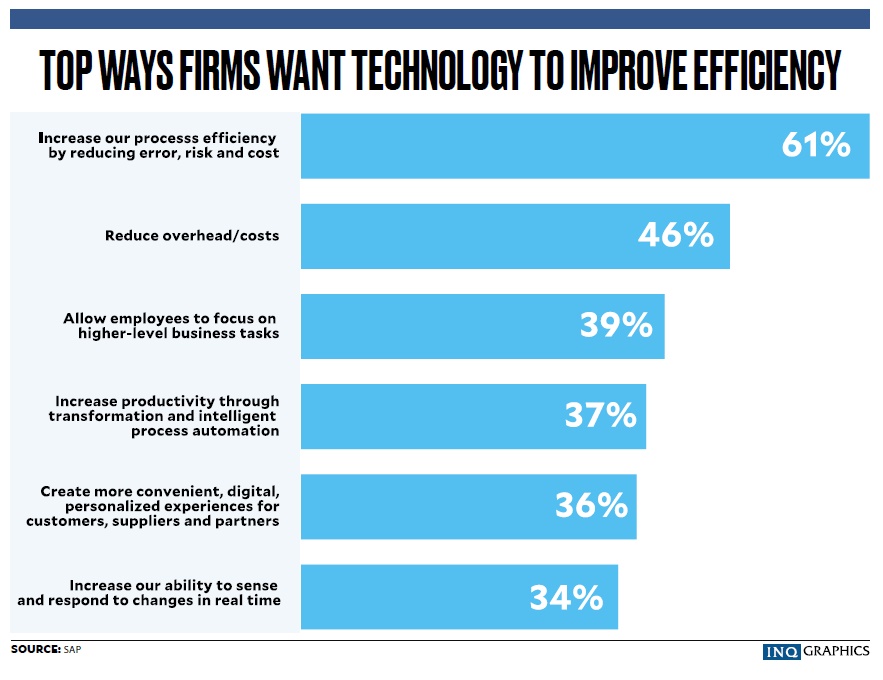Asean enterprises set sights on postpandemic success
The COVID-19 pandemic still has the Philippines and other parts of Southeast Asia firmly in its grip. But even then, enterprises in the region have begun preparing themselves for postcrisis growth.
According to SAP’s regional study “Digital, resilient, and experience-driven: How enterprises in Southeast Asia can prepare for the new economy”, Southeast Asian firms are gaining steady momentum, prioritizing growth and customer experiences. However, they face significant challenges in the areas of talent attraction and retention, cloud adoption, and gaining insights from data.
Conducted in collaboration with Oxford Economics, the study surveyed 600 senior executives—including 400 from small and medium-sized enterprises (SMEs) with less than $500 million in revenue—across Singapore, Malaysia, Thailand, Vietnam, Indonesia, and the Philippines.
New growth path
As economies begin to identify emerging pockets of growth, enterprises have also continued to adapt with resilience, transforming their operations to meet evolving consumer expectations in a new digital economy.
The SAP study said the region’s enterprises considered customer experience as a strategic imperative for survival and growth, with more than a third (35 percent) saying service excellence is now their primary source of value and differentiation.
Article continues after this advertisementPositive customer experiences have also become the foremost strategic consideration for businesses in the region, with key factors being personalization for the customer (59 percent), providing high-quality products and/or services (55 percent), ensuring data protection and privacy (53 percent) and offering competitive pricing (51 percent).
Article continues after this advertisement“Having gotten a foothold on the pandemic’s disruption, businesses across Southeast Asia are at a crucial transformative point to achieve long-term competitive growth,” said Verena Siow, president and managing director of SAP South East Asia, “Regardless of industry, businesses must embrace true business transformation into intelligent enterprises while keeping in mind that customers are the lifeline to survival and sustainable growth.”
Perhaps due to their size and capital constraints, SMEs are finding it more challenging to keep pace with the rapidly evolving business environment compared to the larger companies.
SMEs surveyed cite difficulty adapting to a rapidly changing marketplace (40 percent, vs 29 percent of larger enterprises), keeping up with changing customer wants and needs (38 percent vs 43 percent), and difficulty retaining customers or driving repeat business (34 percent vs 30 percent) as top challenges to meeting their strategic priorities.
PH findings
In the Philippines, large enterprises and SMEs have taken steps to improve experience management in their operations.
The study showed that local companies’ Top 3 primary strategic priorities over the next three years are improving customer experience (53 percent), improving employee experience (42 percent) and attracting new customers (36 percent).
Stand out from the crowd
SMEs and large enterprises in the country believe that customer experience can help them stand out from the crowd.
They seek to improve the experience of their customers, with 42 percent of enterprises seeing service excellence, along with product excellence (18 percent) and innovation (9 percent) as their organization’s three primary sources of value and differentiation, the study said.
To achieve the growth that they seek in their organization, local companies started taking steps through digitalization and improve customer experience.
The study showed that they started soliciting and acting on the customer feedback (94 percent) and started improving customer data analytics (85 percent). They have also begun investing in user-friendly digital experiences (75 percent), which are particularly crucial amid the pandemic that has led to mobility constraints.
Hurdles to overcome
As enterprises adapt their operations to overcome both internal and external challenges, many of them recognize technology as an enabler to help drive greater business outcomes.
According to the study, automation and digital technologies are most believed to support business goals by increasing process efficiency and reducing error, risk and cost. This is followed by reducing overhead costs, allowing employees to focus on higher-level business tasks, and increasing productivity through transformation and intelligent process automation.
A deeper dive into the internal challenges to improving customer experiences reveals businesses’ hurdles around gaining visibility over their operations, and the lack of digital tools that help them to track and direct strategic business priorities.
Those surveyed cite difficulty competing with larger organizations (50 percent), lack of technology for analytics (43 percent), lack of capable and motivated workforce (40 percent), lack of adequate data (38 percent), and difficulty scaling for growth (33 percent) as their top challenges.
“In an ever-increasing digital economy, the enterprises that thrive are those that adapt the quickest. There is a strong need to shift mindsets while constantly seeking new ways of working and redesigning processes. It is only by doing so that businesses can find a way that works best and stay ahead of the competition,” Siow said.
The study revealed that to secure quick growth, enterprises surveyed are employing short-term actions to improve customer experiences, with many investing in user-friendly digital experiences (39 percent have made this change across the organization), reducing prices (38 percent) and increasing after-sales maintenance (37 percent).
Yet, just 58 percent say they have made at least moderate progress toward digital transformation, despite the ability of such tools to grant them insights into opportunities to improve their customer experiences; among SMEs, even fewer—just 45 percent—say they have made moderate progress toward transformation.
Notwithstanding these challenges, SMEs see their nimbleness and ability to build trust with customers as their inherent competitive advantage against larger competitors, which can give them the strong foundation they need to securely experiment with new technologies and business models.
Of the findings, SAP Philippines managing director Edler Panlilio said: “It is satisfying to note how the study revealed that many businesses in the Philippines continue to make the customer their main priority. In my view, companies who are agile to quickly adapt to customer demands are the ones who will win despite any situation. Business transformation has become a crucial step to continuity for businesses of all sizes.”
